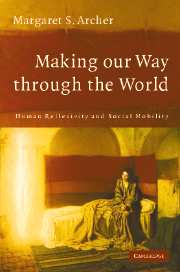Book contents
- Frontmatter
- Contents
- Acknowledgements
- Introduction: reflexivity as the unacknowledged condition of social life
- Part I
- Part II
- Introduction to Part II: how ‘contexts’ and ‘concerns’ shape internal conversations
- 4 Communicative reflexives: working at staying put
- 5 Autonomous reflexives: upward and outward bound
- 6 Meta-reflexives: moving on
- Part III
- Conclusion: reflexivity's future
- Methodological appendix
- Index
Introduction to Part II: how ‘contexts’ and ‘concerns’ shape internal conversations
Published online by Cambridge University Press: 04 December 2009
- Frontmatter
- Contents
- Acknowledgements
- Introduction: reflexivity as the unacknowledged condition of social life
- Part I
- Part II
- Introduction to Part II: how ‘contexts’ and ‘concerns’ shape internal conversations
- 4 Communicative reflexives: working at staying put
- 5 Autonomous reflexives: upward and outward bound
- 6 Meta-reflexives: moving on
- Part III
- Conclusion: reflexivity's future
- Methodological appendix
- Index
Summary
Being reflexive is part of being human and plays a crucial role for humans as social beings, but it is a quality that varies in kind. Since the kinds of internal conversations we hold about ourselves in relation to society and vice versa are maintained to have far-reaching consequences for both, what accounts for such variations in the practice of reflexivity? The theoretical intuition, derived from my previous exploratory investigation, was that all modes of reflexivity were forged from the interplay between subjects' natal social contexts and their ultimate personal concerns. This introduction examines the formula ‘context + concern’, in the light of current findings. The aim is to discover whether distinctive combinations of the two are related to the practices of communicative, autonomous and meta-reflexivity respectively.
It was tentatively advanced that the combination fostering the emergence of the communicative mode as dominant was represented by the following three conditions: firstly, by a dense and continuous natal ‘context’, characterised by geographical stability and resulting in continuity of schooling with the same peers and a continuous social network maintained in the locality; secondly, by stable family relationships, free from marital breakdown, bereavement or repartnering; and thirdly, by the availability of occupational outlets in the vicinity, acceptable to the subject. Next, it was provisionally argued that only if subjects could fulfil their personal ‘concerns’, particularly those of partnership and work, within the boundaries of the natal context would they endorse and thus reproduce this context through the practices they established as their own modus vivendi.
Information
- Type
- Chapter
- Information
- Making our Way through the WorldHuman Reflexivity and Social Mobility, pp. 145 - 157Publisher: Cambridge University PressPrint publication year: 2007
